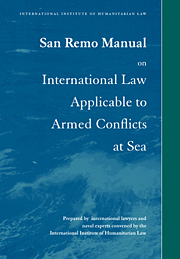 San Remo Manual on International Law Applicable to Armed Conflicts at Sea
San Remo Manual on International Law Applicable to Armed Conflicts at Sea Book contents
- Frontmatter
- Contents
- FOREWORD
- SAN REMO MANUAL
- Introductory note
- Part I General provisions
- Part II Regions of operations
- Part III Basic rules and target discrimination
- Part IV Methods and means of warfare at sea
- Part V Measures short of attack: interception, visit, search, diversion and capture
- Part VI Protected persons, medical transports and medical aircraft
- Annex: Series of meetings and contributions to the project
- EXPLANATION
- INDEX
Part V - Measures short of attack: interception, visit, search, diversion and capture
Published online by Cambridge University Press: 04 August 2010
- Frontmatter
- Contents
- FOREWORD
- SAN REMO MANUAL
- Introductory note
- Part I General provisions
- Part II Regions of operations
- Part III Basic rules and target discrimination
- Part IV Methods and means of warfare at sea
- Part V Measures short of attack: interception, visit, search, diversion and capture
- Part VI Protected persons, medical transports and medical aircraft
- Annex: Series of meetings and contributions to the project
- EXPLANATION
- INDEX
Summary
Section I Determination of enemy character of vessels and aircraft
112 The fact that a merchant vessel is flying the flag of an enemy State or that a civil aircraft bears the marks of an enemy State is conclusive evidence of its enemy character.
113 The fact that a merchant vessel is flying the flag of a neutral State or a civil aircraft bears the marks of a neutral State is prima facie evidence of its neutral character.
114 If the commander of a warship suspects that a merchant vessel flying a neutral flag in fact has enemy character, the commander is entitled to exercise the right of visit and search, including the right of diversion for search under paragraph 121.
115 If the commander of a military aircraft suspects that a civil aircraft with neutral marks in fact has enemy character, the commander is entitled to exercise the right of interception and, if circumstances require, the right to divert for the purpose of visit and search.
116 If, after visit and search, there is reasonable ground for suspicion that the merchant vessel flying a neutral flag or a civil aircraft with neutral marks has enemy character, the vessel or aircraft may be captured as prize subject to adjudication.
117 Enemy character can be determined by registration, ownership, charter or other criteria.
Section II Visit and search of merchant vessels
Basic rules
118 In exercising their legal rights in an international armed conflict at sea, belligerent warships and military aircraft have a right to visit and search merchant vessels outside neutral waters where there are reasonable grounds for suspecting that they are subject to capture.
- Type
- Chapter
- Information
- San Remo Manual on International Law Applicable to Armed Conflicts at SeaInternational Institute of Humanitarian Law, pp. 31 - 40Publisher: Cambridge University PressPrint publication year: 1995
